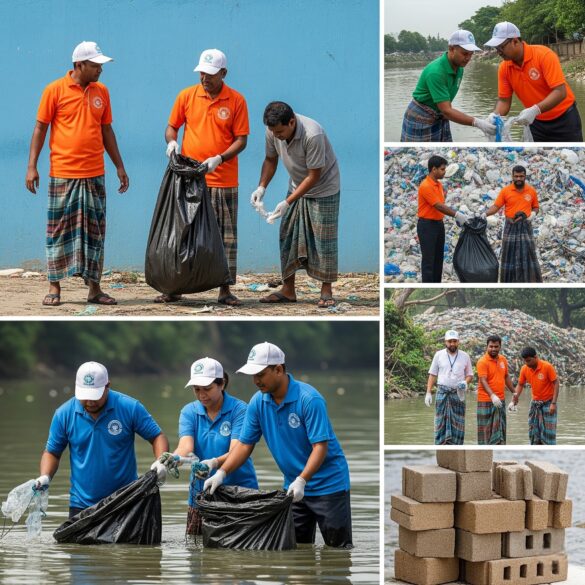Dhaka’s vibrant rivers and canals are the lifeblood of our city, but they face a significant challenge: plastic pollution. This issue not only harms our beautiful waterways and the creatures living within them but also contributes to waterlogging and public health concerns. However, there’s a growing and promising movement to combat this problem through a “circular economy” approach, transforming waste into a valuable resource and safeguarding our environment for the future. A circular economy is a smart way of thinking about how we use resources. Instead of the old “take, make, dispose” method, it focuses on keeping materials in use for as long as possible. For plastic waste, this means reducing how much new plastic we use, reusing plastic items whenever possible, and importantly, recycling discarded plastics into new products. This innovative approach sees plastic waste not as trash, but as a valuable resource that can be collected, processed, and given a new life. Across Dhaka, various initiatives are being put into action to make this circular vision a reality. Efforts include improving waste collection systems, especially in areas along riverbanks and informal settlements, to prevent plastic from ever reaching the water. Strong public awareness campaigns are also vital, educating citizens about the harmful effects of plastic pollution and encouraging them to adopt responsible disposal habits, and to embrace the principles of reducing and reusing. Government agencies, alongside non-governmental organizations and the private sector, are collaborating on these crucial projects. They are working to strengthen policies, for example, by promoting bans on certain single-use plastics and encouraging industries to take responsibility for the entire life cycle of their plastic products. Investing in modern technology for sorting and recycling plastic waste is also a key part of this strategy, turning what was once considered garbage into raw materials for new items. The positive impacts of adopting a circular economy for plastic waste are far-reaching. Our rivers and canals will become cleaner, leading to healthier aquatic life and more pleasant surroundings for everyone. Improved sanitation will boost public health, and cleaner waterways will significantly reduce the problem of waterlogging during monsoon seasons. Furthermore, the growth of the recycling industry can create new “green jobs” in waste collection, sorting, and processing, bringing economic opportunities to many. By embracing the circular economy, Bangladesh is not just tackling a waste problem; it’s building a more sustainable, resilient, and economically vibrant future for Dhaka. These proactive steps show a clear commitment to environmental protection and highlight how innovative thinking can transform challenges into opportunities for growth and well-being for all.
Protecting Dhaka’s Rivers and Canals from Plastic Waste Through Circular
45


